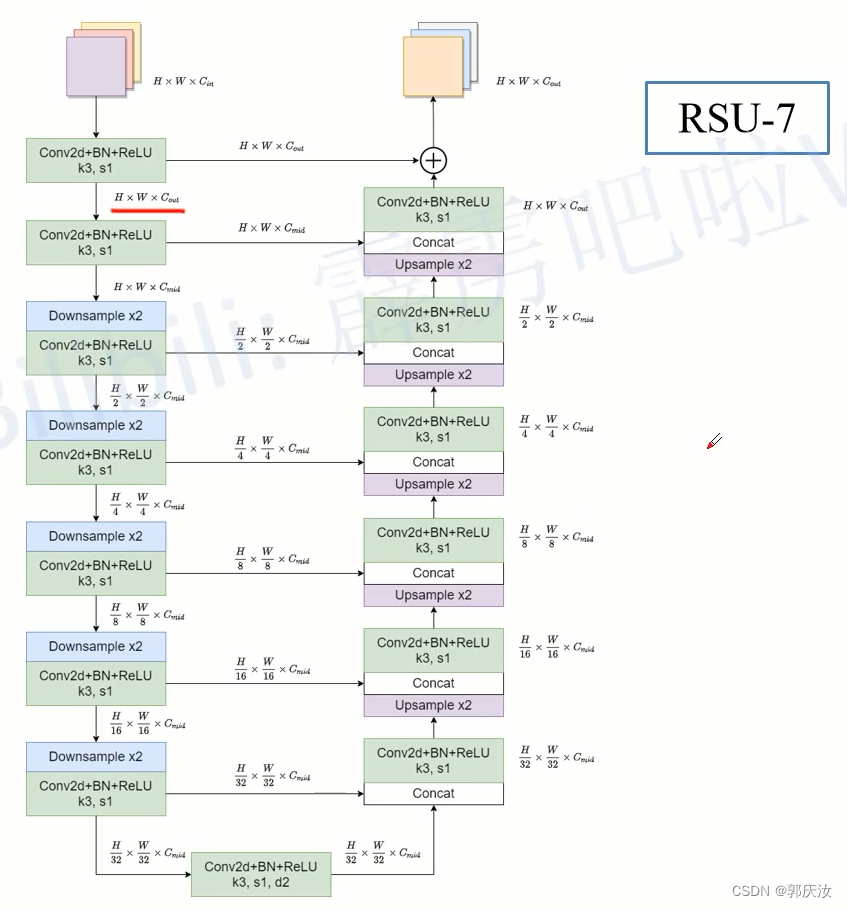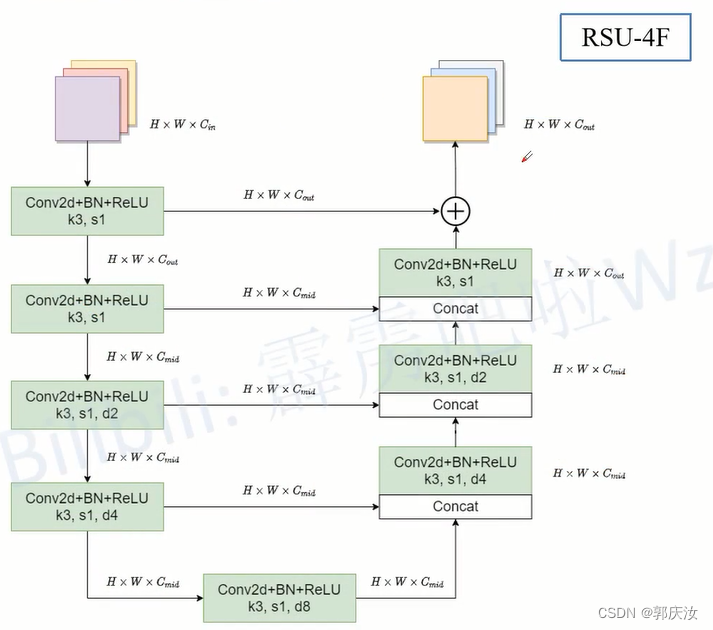- 1hexo博客7:构建简单的多层安全防御体系
- 2【AIGC】Controlnet:基于扩散模型的文生图的可控性_扩散模型 controlnet和adapter对比
- 3【计算机毕设文章】django基于Python的热门旅游景点数据分析系统的设计与实现_基于django美食旅游的功能分析怎么写
- 4Milvus数据实体的插入、修改、删除_milvus 插入数据
- 5【机器学习】TinyML的介绍以及在运动健康领域的应用
- 6毕业设计选题 -- 人工智能与大数据专业毕设选题 机器学习方向
- 7cpu与缓存的关系
- 82023华为od机试C卷【密码解密】C++ 实现_给定一段 “密文”字符串 s ,其中字符都是经过 “密码本” 映射的,现需要将“密文
- 9CNN实现车牌识别_cnn车牌识别
- 10升级GPT4.0问题记录2(手把手)_gpt4.0充值 我们未能验证
图像语义分割 pytorch复现U2Net图像分割网络详解
赞
踩
图像语义分割 pytorch复现U2Net图像分割网络详解

U2-Net: Going Deeper with Nested U-Structure for Salient Object Detection
1、U2Net网络模型结构
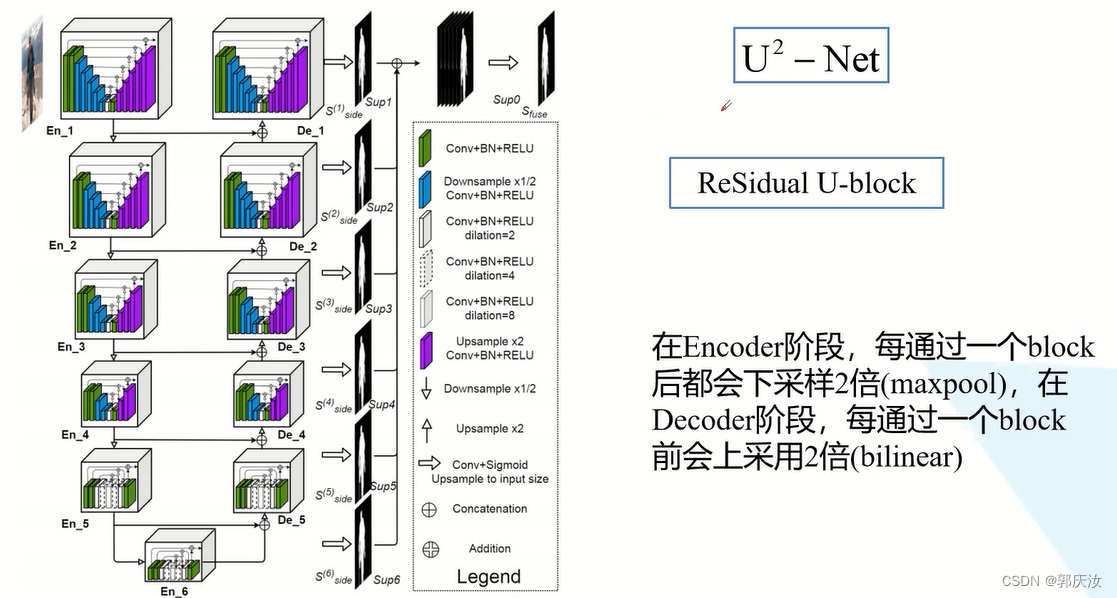
网络的主体类似于U-Net的网络结构,在大的U-Net中,每一个小的block都是一个小型的类似于U-Net的结构,因此作者取名U2Net
仔细观察,可以将网络中的block分成两类:
第一类:En_1 ~ En_4 与 De_1 ~ De_4这8个block采用的block其实是一样的,只不过模块的深度不同。
第二类:En_5、En_6、De_5
- 在整个U2Net网络中,在Encoder阶段,每通过一个block都会进行一次下采样操作(下采样2倍,maxpool)
- 在Decoder阶段,在每个block之间,都会进行一次上采样(2倍,bilinear)
2、block模块结构解析
在 En_1 与 De_1 模块中,采用的 block 是RSU-7;
En_2 与 De_2采用的 block 是RSU-6(RSU-6相对于RSU-7 就是少了一个下采样卷积以及上采样卷积的部分,RSU-6 block只会下采样16倍,RSU-7 block下采样的32倍);
En_3 与 De_3采用的 block 是RSU-5
En_4 与 De_4采用的 block 是RSU-4
En_5、En_6、De_5采用的block是RSU-4F
(使用RSU-4F的原因:因为数据经过En_1 ~ En4 下采样处理后对应特征图的高与宽就已经相对比较小了,如果再继续下采样就会丢失很多上下文信息,作者为了保留上下文信息,就对En_5、En_6、De_5不再进行下采样了而是在RSU-4F的模块中,将下采样、上采样结构换成了膨胀卷积)
RSU-7模块
详细结构图解
RSU-4F
saliency map fusion module
saliency map fusion module模块是将每个阶段的特征图进行融合,得到最终的预测概率图,即下图中,红色框标注的模块
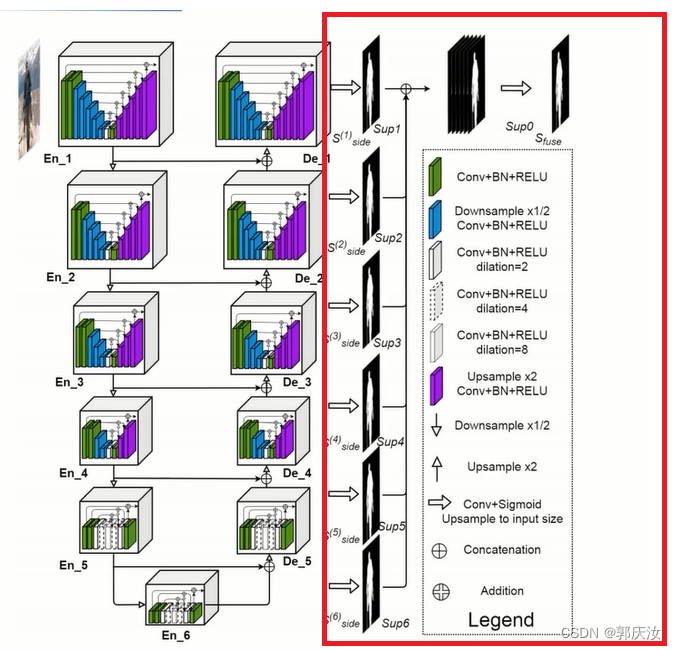
其会收集De_1、De_2、De_3、De_4、De_5、En_6模块的输出,将这些输出分别通过一个3x3的卷积层(这些卷积层的kerner的个数都是为1)输出的featuremap的channel是为1的,在经过双线性插值算法将得到的特征图还原回输入图像的大小;再将得到的6个特征图进行concant拼接;在经过一个1x1的卷积层以及sigmoid激活函数,最终得到融合之后的预测概率图。
U2Net网络结构详细参数配置
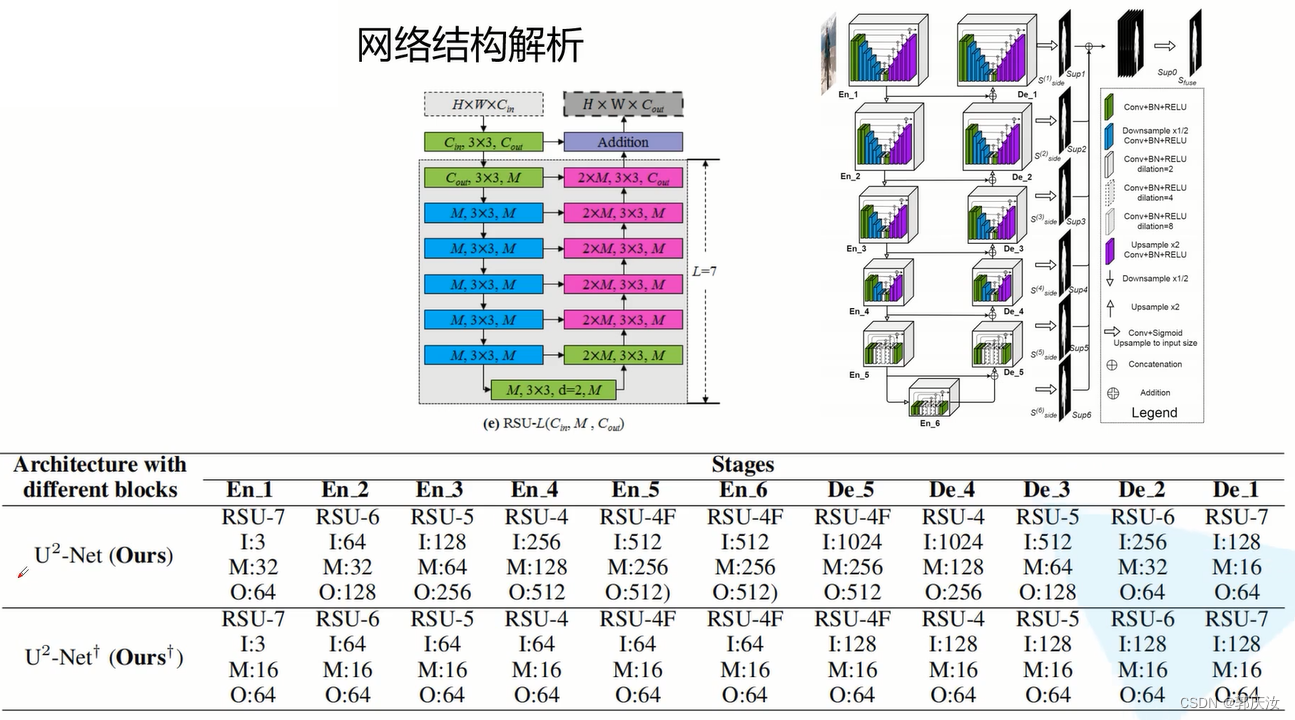
u2net_full大小为176.3M、u2net_lite大小为4.7M
RSU模块代码实现
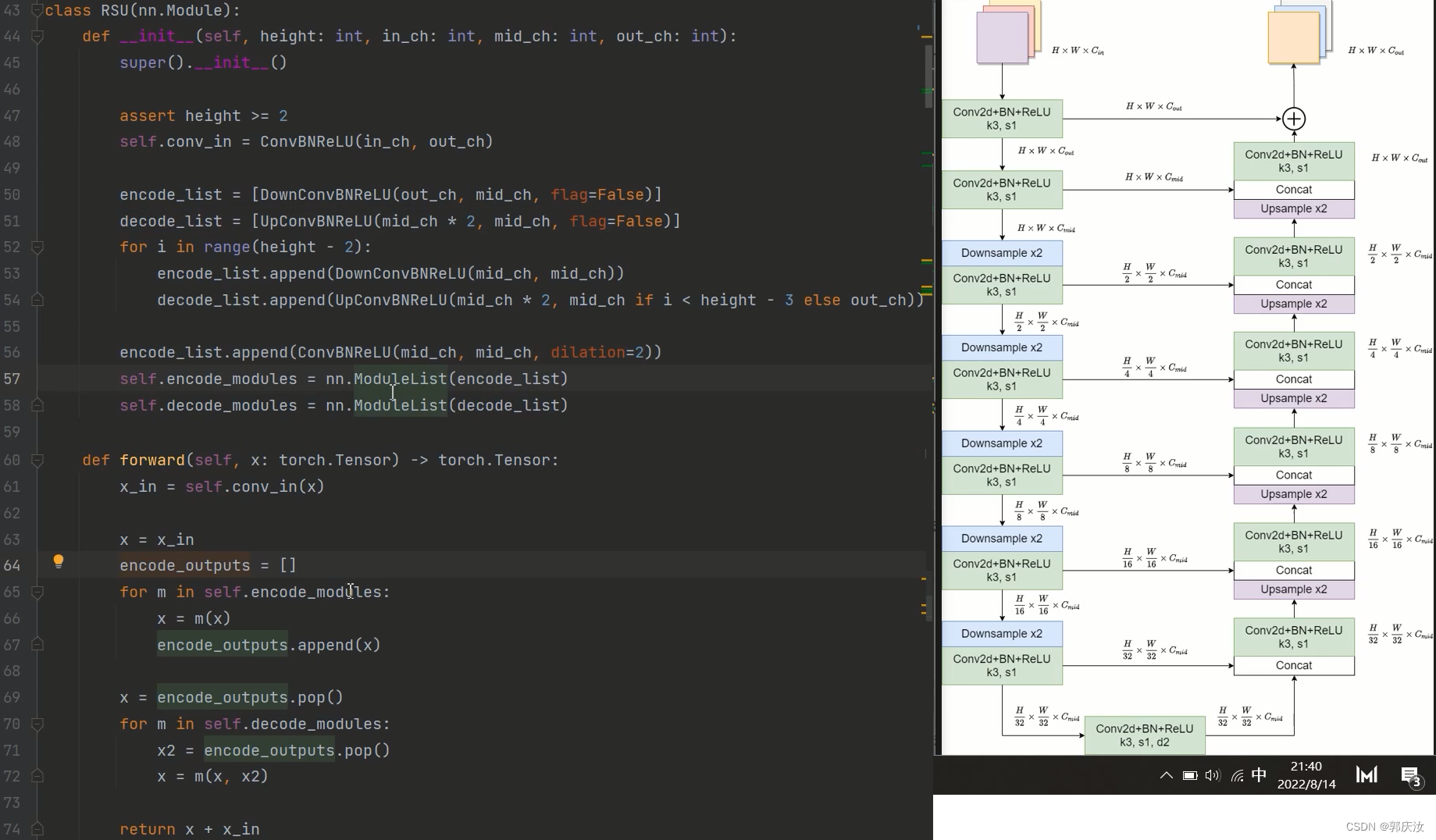
class RSU(nn.Module):
def __init__(self, height: int, in_ch: int, mid_ch: int, out_ch: int):
super().__init__()
assert height >= 2
self.conv_in = ConvBNReLU(in_ch, out_ch)
encode_list = [DownConvBNReLU(out_ch, mid_ch, flag=False)]
decode_list = [UpConvBNReLU(mid_ch * 2, mid_ch, flag=False)]
for i in range(height - 2):
encode_list.append(DownConvBNReLU(mid_ch, mid_ch))
decode_list.append(UpConvBNReLU(mid_ch * 2, mid_ch if i < height - 3 else out_ch))
encode_list.append(ConvBNReLU(mid_ch, mid_ch, dilation=2))
self.encode_modules = nn.ModuleList(encode_list)
self.decode_modules = nn.ModuleList(decode_list)
def forward(self, x: torch.Tensor) -> torch.Tensor:
x_in = self.conv_in(x)
x = x_in
encode_outputs = []
for m in self.encode_modules:
x = m(x)
encode_outputs.append(x)
x = encode_outputs.pop()
for m in self.decode_modules:
x2 = encode_outputs.pop()
x = m(x, x2)
return x + x_in
- 1
- 2
- 3
- 4
- 5
- 6
- 7
- 8
- 9
- 10
- 11
- 12
- 13
- 14
- 15
- 16
- 17
- 18
- 19
- 20
- 21
- 22
- 23
- 24
- 25
- 26
- 27
- 28
- 29
- 30
- 31
- 32
- 33
RSU4F模块代码实现
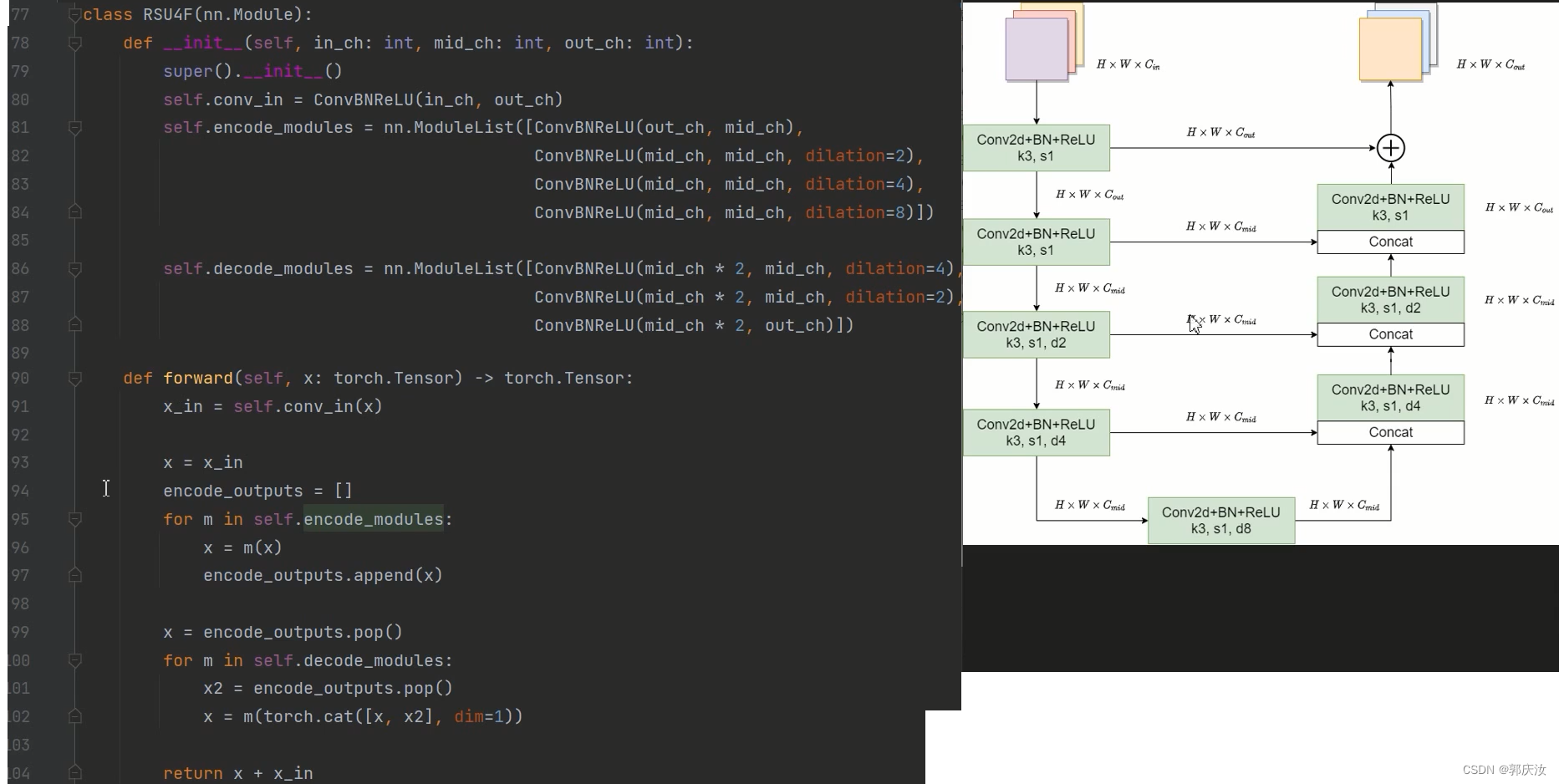
class RSU4F(nn.Module):
def __init__(self, in_ch: int, mid_ch: int, out_ch: int):
super().__init__()
self.conv_in = ConvBNReLU(in_ch, out_ch)
self.encode_modules = nn.ModuleList([ConvBNReLU(out_ch, mid_ch),
ConvBNReLU(mid_ch, mid_ch, dilation=2),
ConvBNReLU(mid_ch, mid_ch, dilation=4),
ConvBNReLU(mid_ch, mid_ch, dilation=8)])
self.decode_modules = nn.ModuleList([ConvBNReLU(mid_ch * 2, mid_ch, dilation=4),
ConvBNReLU(mid_ch * 2, mid_ch, dilation=2),
ConvBNReLU(mid_ch * 2, out_ch)])
def forward(self, x: torch.Tensor) -> torch.Tensor:
x_in = self.conv_in(x)
x = x_in
encode_outputs = []
for m in self.encode_modules:
x = m(x)
encode_outputs.append(x)
x = encode_outputs.pop()
for m in self.decode_modules:
x2 = encode_outputs.pop()
x = m(torch.cat([x, x2], dim=1))
return x + x_in
- 1
- 2
- 3
- 4
- 5
- 6
- 7
- 8
- 9
- 10
- 11
- 12
- 13
- 14
- 15
- 16
- 17
- 18
- 19
- 20
- 21
- 22
- 23
- 24
- 25
- 26
- 27
- 28
- 29
u2net_full与u2net_lite模型配置函数
def u2net_full(out_ch: int = 1):
cfg = {
# height, in_ch, mid_ch, out_ch, RSU4F, side side:表示是否要收集当前block的输出
"encode": [[7, 3, 32, 64, False, False], # En1
[6, 64, 32, 128, False, False], # En2
[5, 128, 64, 256, False, False], # En3
[4, 256, 128, 512, False, False], # En4
[4, 512, 256, 512, True, False], # En5
[4, 512, 256, 512, True, True]], # En6
# height, in_ch, mid_ch, out_ch, RSU4F, side
"decode": [[4, 1024, 256, 512, True, True], # De5
[4, 1024, 128, 256, False, True], # De4
[5, 512, 64, 128, False, True], # De3
[6, 256, 32, 64, False, True], # De2
[7, 128, 16, 64, False, True]] # De1
}
return U2Net(cfg, out_ch)
def u2net_lite(out_ch: int = 1):
cfg = {
# height, in_ch, mid_ch, out_ch, RSU4F, side
"encode": [[7, 3, 16, 64, False, False], # En1
[6, 64, 16, 64, False, False], # En2
[5, 64, 16, 64, False, False], # En3
[4, 64, 16, 64, False, False], # En4
[4, 64, 16, 64, True, False], # En5
[4, 64, 16, 64, True, True]], # En6
# height, in_ch, mid_ch, out_ch, RSU4F, side
"decode": [[4, 128, 16, 64, True, True], # De5
[4, 128, 16, 64, False, True], # De4
[5, 128, 16, 64, False, True], # De3
[6, 128, 16, 64, False, True], # De2
[7, 128, 16, 64, False, True]] # De1
}
- 1
- 2
- 3
- 4
- 5
- 6
- 7
- 8
- 9
- 10
- 11
- 12
- 13
- 14
- 15
- 16
- 17
- 18
- 19
- 20
- 21
- 22
- 23
- 24
- 25
- 26
- 27
- 28
- 29
- 30
- 31
- 32
- 33
- 34
- 35
- 36
U2Net网络整体定义类
class U2Net(nn.Module):
def __init__(self, cfg: dict, out_ch: int = 1):
super().__init__()
assert "encode" in cfg
assert "decode" in cfg
self.encode_num = len(cfg["encode"])
encode_list = []
side_list = []
for c in cfg["encode"]:
# c: [height, in_ch, mid_ch, out_ch, RSU4F, side]
assert len(c) == 6
encode_list.append(RSU(*c[:4]) if c[4] is False else RSU4F(*c[1:4])) # 判断当前是构建RSU模块,还是构建RSU4F模块
if c[5] is True:
side_list.append(nn.Conv2d(c[3], out_ch, kernel_size=3, padding=1))
self.encode_modules = nn.ModuleList(encode_list)
decode_list = []
for c in cfg["decode"]:
# c: [height, in_ch, mid_ch, out_ch, RSU4F, side]
assert len(c) == 6
decode_list.append(RSU(*c[:4]) if c[4] is False else RSU4F(*c[1:4]))
if c[5] is True:
side_list.append(nn.Conv2d(c[3], out_ch, kernel_size=3, padding=1)) # 收集当前block的输出
self.decode_modules = nn.ModuleList(decode_list)
self.side_modules = nn.ModuleList(side_list)
self.out_conv = nn.Conv2d(self.encode_num * out_ch, out_ch, kernel_size=1) # 构建一个1x1的卷积层,去融合来自不同尺度的信息
def forward(self, x: torch.Tensor) -> Union[torch.Tensor, List[torch.Tensor]]:
_, _, h, w = x.shape
# collect encode outputs
encode_outputs = []
for i, m in enumerate(self.encode_modules):
x = m(x)
encode_outputs.append(x)
if i != self.encode_num - 1: # 此处需要进行判断,因为在没通过一个encoder模块后,都需要进行下采样的,但最后一个模块后,是不需要下采样的
x = F.max_pool2d(x, kernel_size=2, stride=2, ceil_mode=True)
# collect decode outputs
x = encode_outputs.pop()
decode_outputs = [x]
for m in self.decode_modules:
x2 = encode_outputs.pop()
x = F.interpolate(x, size=x2.shape[2:], mode='bilinear', align_corners=False)
x = m(torch.concat([x, x2], dim=1))
decode_outputs.insert(0, x)
# collect side outputs
side_outputs = []
for m in self.side_modules:
x = decode_outputs.pop()
x = F.interpolate(m(x), size=[h, w], mode='bilinear', align_corners=False)
side_outputs.insert(0, x)
x = self.out_conv(torch.concat(side_outputs, dim=1))
if self.training:
# do not use torch.sigmoid for amp safe
return [x] + side_outputs # 用于计算损失
else:
return torch.sigmoid(x)
- 1
- 2
- 3
- 4
- 5
- 6
- 7
- 8
- 9
- 10
- 11
- 12
- 13
- 14
- 15
- 16
- 17
- 18
- 19
- 20
- 21
- 22
- 23
- 24
- 25
- 26
- 27
- 28
- 29
- 30
- 31
- 32
- 33
- 34
- 35
- 36
- 37
- 38
- 39
- 40
- 41
- 42
- 43
- 44
- 45
- 46
- 47
- 48
- 49
- 50
- 51
- 52
- 53
- 54
- 55
- 56
- 57
- 58
- 59
- 60
- 61
- 62
- 63
- 64
- 65
损失函数计算
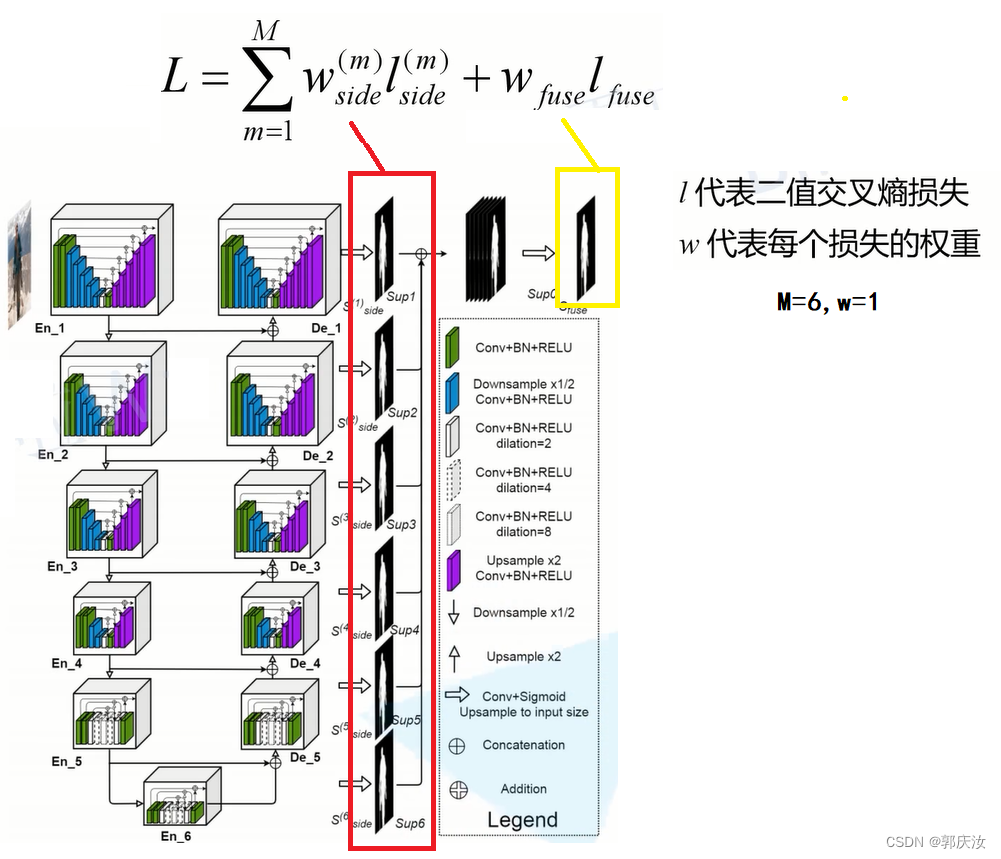
如上图所示,红色框部分为每个分量与真实标签的交叉熵损失函数求和;黄色框标部分为将各个分量经双线性插值恢复至原始尺寸、进行concant处理、经过1x1的卷积核与sigmoid处理后的结果与真实标签的交叉熵损失函数。
损失函数代码实现:
import math
import torch
from torch.nn import functional as F
import train_utils.distributed_utils as utils
def criterion(inputs, target):
losses = [F.binary_cross_entropy_with_logits(inputs[i], target) for i in range(len(inputs))]
total_loss = sum(losses)
return total_loss
- 1
- 2
- 3
- 4
- 5
- 6
- 7
- 8
- 9
- 10
- 11
- 12
评价指标
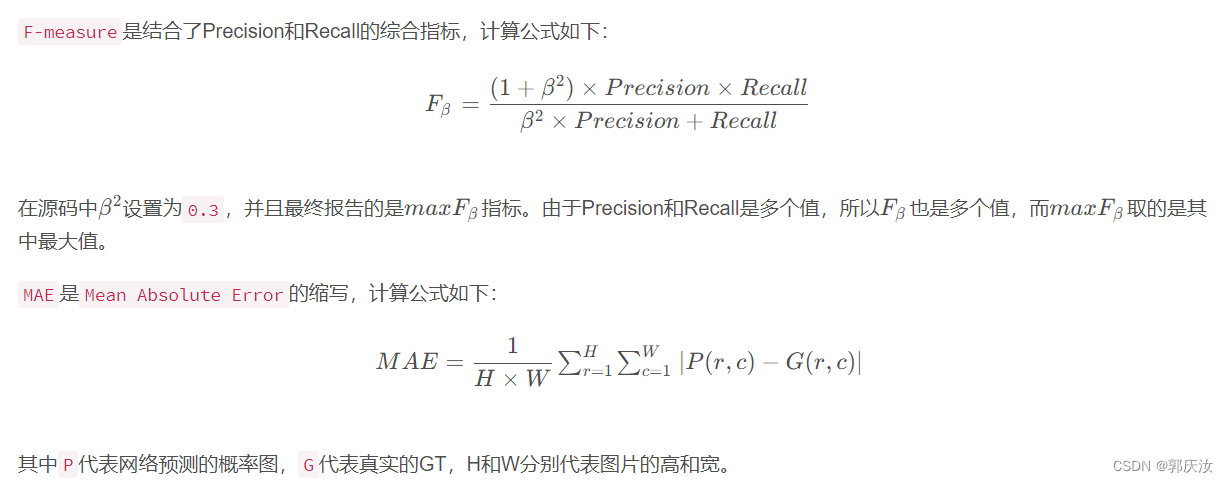
其中F-measure是在0~1之间的,数值越大,代表的网络分割效果越好;
MAE是Mean Absolute Error的缩写,其值是在0~1之间的,越趋近于0,代表网络性能越好。
数据集

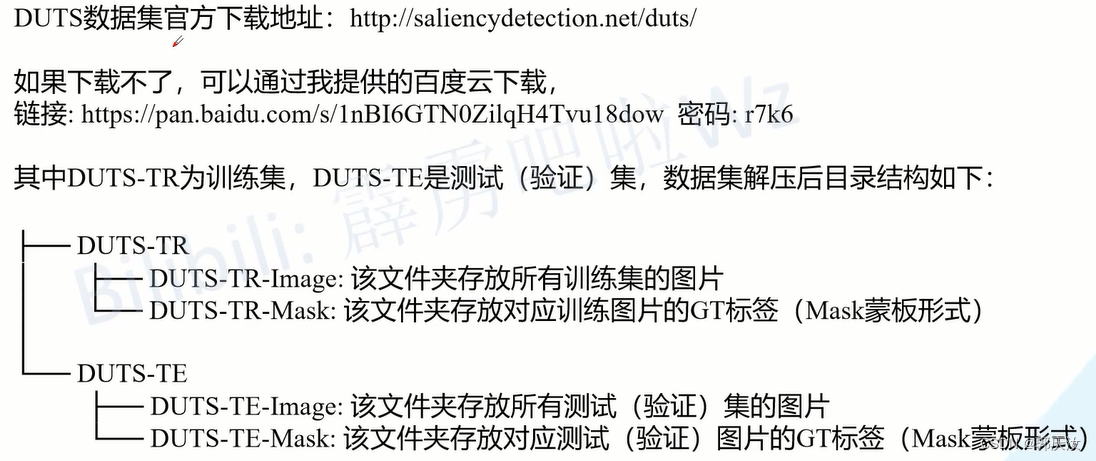
pytorch训练U2Net图像分割模型
项目目录结构:
├── src: 搭建网络相关代码
├── train_utils: 训练以及验证相关代码
├── my_dataset.py: 自定义数据集读取相关代码
├── predict.py: 简易的预测代码
├── train.py: 单GPU或CPU训练代码
├── train_multi_GPU.py: 多GPU并行训练代码
├── validation.py: 单独验证模型相关代码
├── transforms.py: 数据预处理相关代码
└── requirements.txt: 项目依赖
- 1
- 2
- 3
- 4
- 5
- 6
- 7
- 8
- 9
项目目录:
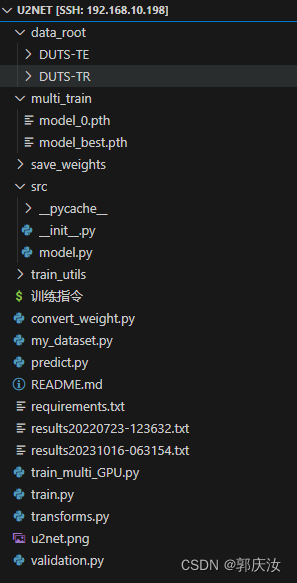
项目中u2net_full大小为176.3M、u2net_lite大小为4.7M,演示过程中,训练的为u2net_lite版本
多GPU训练指令:
pytorch版本为1.7
CUDA_VISIBLE_DEVICES=0,1 python -m torch.distributed.launch --nproc_per_node=2 --use_env train_multi_GPU.py --data-path ./data_root
- 1
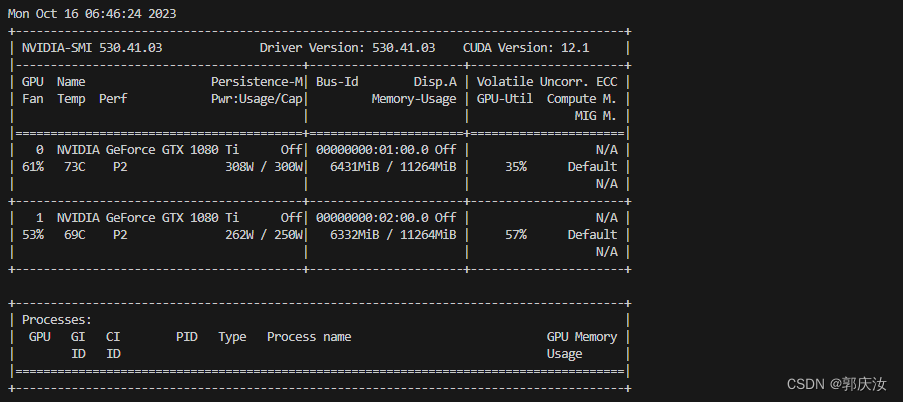
训练过程损失函数,评估指标变化
[epoch: 0] train_loss: 3.0948 lr: 0.000500 MAE: 0.263 maxF1: 0.539
[epoch: 10] train_loss: 1.1108 lr: 0.000998 MAE: 0.111 maxF1: 0.729
[epoch: 20] train_loss: 0.8480 lr: 0.000993 MAE: 0.093 maxF1: 0.764
[epoch: 30] train_loss: 0.7438 lr: 0.000984 MAE: 0.086 maxF1: 0.776
[epoch: 40] train_loss: 0.6625 lr: 0.000971 MAE: 0.082 maxF1: 0.790
[epoch: 50] train_loss: 0.5897 lr: 0.000954 MAE: 0.077 maxF1: 0.801
[epoch: 60] train_loss: 0.5273 lr: 0.000934 MAE: 0.071 maxF1: 0.808
[epoch: 70] train_loss: 0.5139 lr: 0.000911 MAE: 0.079 maxF1: 0.787
[epoch: 80] train_loss: 0.4775 lr: 0.000885 MAE: 0.073 maxF1: 0.801
[epoch: 90] train_loss: 0.4601 lr: 0.000855 MAE: 0.069 maxF1: 0.809
[epoch: 100] train_loss: 0.4529 lr: 0.000823 MAE: 0.065 maxF1: 0.805
[epoch: 110] train_loss: 0.4441 lr: 0.000788 MAE: 0.068 maxF1: 0.810
[epoch: 120] train_loss: 0.3991 lr: 0.000751 MAE: 0.066 maxF1: 0.806
[epoch: 130] train_loss: 0.3903 lr: 0.000712 MAE: 0.065 maxF1: 0.824
[epoch: 140] train_loss: 0.3770 lr: 0.000672 MAE: 0.060 maxF1: 0.823
[epoch: 150] train_loss: 0.3666 lr: 0.000630 MAE: 0.064 maxF1: 0.825
[epoch: 160] train_loss: 0.3530 lr: 0.000587 MAE: 0.060 maxF1: 0.829
[epoch: 170] train_loss: 0.3557 lr: 0.000544 MAE: 0.063 maxF1: 0.820
[epoch: 180] train_loss: 0.3430 lr: 0.000500 MAE: 0.065 maxF1: 0.816
[epoch: 190] train_loss: 0.3366 lr: 0.000456 MAE: 0.059 maxF1: 0.832
[epoch: 200] train_loss: 0.3285 lr: 0.000413 MAE: 0.062 maxF1: 0.822
[epoch: 210] train_loss: 0.3197 lr: 0.000370 MAE: 0.058 maxF1: 0.829
[epoch: 220] train_loss: 0.3093 lr: 0.000328 MAE: 0.058 maxF1: 0.828
[epoch: 230] train_loss: 0.3071 lr: 0.000288 MAE: 0.058 maxF1: 0.827
[epoch: 240] train_loss: 0.2983 lr: 0.000249 MAE: 0.056 maxF1: 0.830
[epoch: 250] train_loss: 0.2932 lr: 0.000212 MAE: 0.060 maxF1: 0.825
[epoch: 260] train_loss: 0.2908 lr: 0.000177 MAE: 0.060 maxF1: 0.828
[epoch: 270] train_loss: 0.2895 lr: 0.000145 MAE: 0.057 maxF1: 0.832
[epoch: 280] train_loss: 0.2834 lr: 0.000115 MAE: 0.057 maxF1: 0.832
[epoch: 290] train_loss: 0.2762 lr: 0.000089 MAE: 0.056 maxF1: 0.833
[epoch: 300] train_loss: 0.2760 lr: 0.000066 MAE: 0.056 maxF1: 0.832
[epoch: 310] train_loss: 0.2752 lr: 0.000046 MAE: 0.057 maxF1: 0.832
[epoch: 320] train_loss: 0.2782 lr: 0.000029 MAE: 0.056 maxF1: 0.834
[epoch: 330] train_loss: 0.2744 lr: 0.000016 MAE: 0.056 maxF1: 0.832
[epoch: 340] train_loss: 0.2752 lr: 0.000007 MAE: 0.056 maxF1: 0.832
[epoch: 350] train_loss: 0.2739 lr: 0.000002 MAE: 0.057 maxF1: 0.831
[epoch: 359] train_loss: 0.2770 lr: 0.000000 MAE: 0.056 maxF1: 0.833
- 1
- 2
- 3
- 4
- 5
- 6
- 7
- 8
- 9
- 10
- 11
- 12
- 13
- 14
- 15
- 16
- 17
- 18
- 19
- 20
- 21
- 22
- 23
- 24
- 25
- 26
- 27
- 28
- 29
- 30
- 31
- 32
- 33
- 34
- 35
- 36
- 37
- 38
模型测试
import os
import time
import cv2
import numpy as np
import matplotlib.pyplot as plt
import torch
from torchvision.transforms import transforms
from src import u2net_full,u2net_lite
def time_synchronized():
torch.cuda.synchronize() if torch.cuda.is_available() else None
return time.time()
def main():
weights_path = "./multi_train/model_best.pth"
img_path = "./test_image.PNG"
threshold = 0.5
assert os.path.exists(img_path), f"image file {img_path} dose not exists."
device = torch.device("cuda:0" if torch.cuda.is_available() else "cpu")
data_transform = transforms.Compose([
transforms.ToTensor(),
transforms.Resize(320),
transforms.Normalize(mean=(0.485, 0.456, 0.406),
std=(0.229, 0.224, 0.225))
])
origin_img = cv2.cvtColor(cv2.imread(img_path, flags=cv2.IMREAD_COLOR), cv2.COLOR_BGR2RGB)
h, w = origin_img.shape[:2]
img = data_transform(origin_img)
img = torch.unsqueeze(img, 0).to(device) # [C, H, W] -> [1, C, H, W]
# model = u2net_full()
model =u2net_lite()
weights = torch.load(weights_path, map_location='cpu')
if "model" in weights:
model.load_state_dict(weights["model"])
else:
model.load_state_dict(weights)
model.to(device)
model.eval()
with torch.no_grad():
# init model
img_height, img_width = img.shape[-2:]
init_img = torch.zeros((1, 3, img_height, img_width), device=device)
model(init_img)
t_start = time_synchronized()
pred = model(img)
t_end = time_synchronized()
print("inference time: {}".format(t_end - t_start))
pred = torch.squeeze(pred).to("cpu").numpy() # [1, 1, H, W] -> [H, W]
pred = cv2.resize(pred, dsize=(w, h), interpolation=cv2.INTER_LINEAR)
pred_mask = np.where(pred > threshold, 1, 0)
origin_img = np.array(origin_img, dtype=np.uint8)
seg_img = origin_img * pred_mask[..., None]
plt.imshow(seg_img)
plt.show()
cv2.imwrite("pred_result.png", cv2.cvtColor(seg_img.astype(np.uint8), cv2.COLOR_RGB2BGR))
if __name__ == '__main__':
main()
- 1
- 2
- 3
- 4
- 5
- 6
- 7
- 8
- 9
- 10
- 11
- 12
- 13
- 14
- 15
- 16
- 17
- 18
- 19
- 20
- 21
- 22
- 23
- 24
- 25
- 26
- 27
- 28
- 29
- 30
- 31
- 32
- 33
- 34
- 35
- 36
- 37
- 38
- 39
- 40
- 41
- 42
- 43
- 44
- 45
- 46
- 47
- 48
- 49
- 50
- 51
- 52
- 53
- 54
- 55
- 56
- 57
- 58
- 59
- 60
- 61
- 62
- 63
- 64
- 65
- 66
- 67
- 68
- 69
- 70
- 71
- 72

训练的为u2net_full版本
训练指标如下:
[epoch: 0] train_loss: 2.7158 lr: 0.000500 MAE: 0.216 maxF1: 0.583
[epoch: 10] train_loss: 1.0359 lr: 0.000998 MAE: 0.105 maxF1: 0.745
[epoch: 20] train_loss: 0.7130 lr: 0.000993 MAE: 0.087 maxF1: 0.778
[epoch: 30] train_loss: 0.5375 lr: 0.000984 MAE: 0.077 maxF1: 0.810
[epoch: 40] train_loss: 0.4661 lr: 0.000971 MAE: 0.069 maxF1: 0.826
[epoch: 50] train_loss: 0.4181 lr: 0.000954 MAE: 0.065 maxF1: 0.823
[epoch: 60] train_loss: 0.3914 lr: 0.000934 MAE: 0.065 maxF1: 0.826
[epoch: 70] train_loss: 0.3353 lr: 0.000911 MAE: 0.059 maxF1: 0.840
[epoch: 80] train_loss: 0.2847 lr: 0.000885 MAE: 0.058 maxF1: 0.835
[epoch: 90] train_loss: 0.2977 lr: 0.000855 MAE: 0.056 maxF1: 0.843
[epoch: 100] train_loss: 0.2538 lr: 0.000823 MAE: 0.054 maxF1: 0.848
[epoch: 110] train_loss: 0.2653 lr: 0.000788 MAE: 0.052 maxF1: 0.848
[epoch: 120] train_loss: 0.2365 lr: 0.000751 MAE: 0.052 maxF1: 0.841
[epoch: 130] train_loss: 0.2397 lr: 0.000712 MAE: 0.056 maxF1: 0.843
[epoch: 140] train_loss: 0.2180 lr: 0.000672 MAE: 0.051 maxF1: 0.854
[epoch: 150] train_loss: 0.2060 lr: 0.000630 MAE: 0.051 maxF1: 0.853
[epoch: 160] train_loss: 0.2002 lr: 0.000587 MAE: 0.052 maxF1: 0.853
[epoch: 170] train_loss: 0.1952 lr: 0.000544 MAE: 0.050 maxF1: 0.859
[epoch: 180] train_loss: 0.1893 lr: 0.000500 MAE: 0.053 maxF1: 0.851
[epoch: 190] train_loss: 0.1838 lr: 0.000456 MAE: 0.050 maxF1: 0.852
[epoch: 200] train_loss: 0.1779 lr: 0.000413 MAE: 0.049 maxF1: 0.858
[epoch: 210] train_loss: 0.1745 lr: 0.000370 MAE: 0.052 maxF1: 0.851
[epoch: 220] train_loss: 0.1703 lr: 0.000328 MAE: 0.050 maxF1: 0.854
[epoch: 230] train_loss: 0.1667 lr: 0.000288 MAE: 0.049 maxF1: 0.855
[epoch: 240] train_loss: 0.1640 lr: 0.000249 MAE: 0.049 maxF1: 0.855
[epoch: 250] train_loss: 0.1618 lr: 0.000212 MAE: 0.049 maxF1: 0.855
[epoch: 260] train_loss: 0.1598 lr: 0.000177 MAE: 0.048 maxF1: 0.856
[epoch: 270] train_loss: 0.1580 lr: 0.000145 MAE: 0.049 maxF1: 0.856
[epoch: 280] train_loss: 0.1572 lr: 0.000115 MAE: 0.049 maxF1: 0.853
[epoch: 290] train_loss: 0.1561 lr: 0.000089 MAE: 0.047 maxF1: 0.857
[epoch: 300] train_loss: 0.1550 lr: 0.000066 MAE: 0.047 maxF1: 0.858
[epoch: 310] train_loss: 0.1543 lr: 0.000046 MAE: 0.048 maxF1: 0.854
[epoch: 320] train_loss: 0.1539 lr: 0.000029 MAE: 0.048 maxF1: 0.854
- 1
- 2
- 3
- 4
- 5
- 6
- 7
- 8
- 9
- 10
- 11
- 12
- 13
- 14
- 15
- 16
- 17
- 18
- 19
- 20
- 21
- 22
- 23
- 24
- 25
- 26
- 27
- 28
- 29
- 30
- 31
- 32
- 33
- 34
- 35


